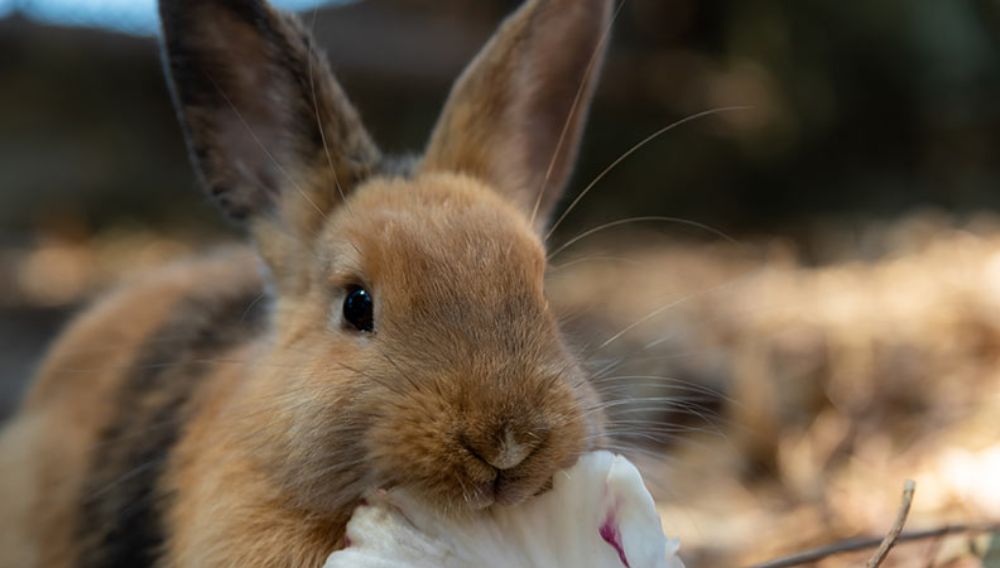
Pinworms in rabbits are caused by a type of worm known as Passalurus ambiguus. This parasitic infection can affect pets and wild rabbits, leading to weight loss, poor coat condition and behavioural changes. Early detection and appropriate treatment ensure your bunny stays healthy and happy.
In this article, we'll explore how to recognise pinworm infections in rabbits, how to get rid of pinworms in rabbits, and how to prevent these pesky parasites from affecting your pet rabbits.
How Do I Know If My Rabbit Is Infected With Pinworms?
Pinworms live in the intestines of rabbits and can go undetected. Low levels don't usually cause any problems in adult rabbits. Finding pinworms in rabbit poop is usually one of the first signs of an infestation.
Adult pinworms look like small white worms. You might also observe pinworm eggs around the anus or in the bedding area of your rabbit's enclosure. The eggs are often visible to the naked eye as tiny specks.
Other signs of pinworms in rabbits include:
- Scratching/biting: If your rabbit is constantly scratching or biting its back end, this could be a sign that it's dealing with an itchy infection caused by pinworms.
- Weight loss: Infected rabbits may lose weight despite eating well. This is often because the worms consume nutrients the rabbit needs for its own health.
- Poor coat condition: Rabbits with pinworms often develop a dull or matted coat, as the infection can interfere with nutrient absorption and overall health.
- Changes in eating behaviour: Affected rabbits may show a decreased interest in food, leading to a noticeable drop in how much your rabbit eats. This can be due to discomfort or inflammation caused by the worms.
- Diarrhoea: May be seen in rabbits with a large infestation of pinworms.
- Restlessness or lethargy: Infected rabbits may exhibit unusual behaviours, including restlessness, lethargy, or a decrease in activity level.
If you observe any of these symptoms, it's important to take your rabbit to the vet for a proper diagnosis. Prompt treatment can prevent the infection from becoming more severe.
How to Treat Pinworms in Rabbits
When you visit the vet for treatment, they'll conduct tests to confirm the presence of pinworms. This is often through a faecal examination to look for pinworm eggs or the worms themselves in the rabbit's poo. Based on the severity of the infection, treatment for pinworms in rabbits typically involves anti-parasitic medication prescribed by a vet.
It's important to note that pinworms in rabbits are generally not a major threat if treated promptly. However, if left untreated, the infection can cause a rabbit to become malnourished due to loss of appetite, which can be particularly dangerous for young rabbits or weakened animals.
In addition to medication, you may also need to address your rabbit's environment to ensure that the eggs aren't reintroduced into their system.
Pinworm eggs can survive in your rabbit's living environment, so cleaning the cage or grazing area is crucial. Scrub down the cage, bedding area, and any places where your rabbit spends time. Pinworm eggs can be tough to remove, so make sure to disinfect thoroughly.
Make sure your rabbit is eating well and remains hydrated during treatment. In some cases, pinworm infestations may cause digestive upset, so offering your rabbit high-fibre foods like hay can support their recovery.
Following treatment, your vet may recommend a follow-up faecal examination to ensure all pinworms and their eggs have been cleared from your rabbit's system.
How to Prevent Pinworms in Rabbits
Preventing pinworm infestations in rabbits involves a combination of good hygiene practices and maintaining a clean environment.
Here are some steps to help prevent pinworm infections in your rabbit:
- Regular cleaning: Clean your rabbit's living space regularly, including their bedding, litter box, and grazing area. Pinworm eggs can be easily passed through poo, so keeping their environment clean is the first line of defence.
- Limit exposure to infected animals: Pinworms are highly contagious, so avoid letting your rabbit interact with infected animals. This includes cats and dogs, which may carry parasites and spread them through their poop.
- Proper hygiene after handling rabbits: Always wash your hands thoroughly after handling your rabbit, cleaning their cage, or cleaning up their poo. This reduces the risk of transferring any pinworm eggs to other rabbits.
Conclusion
Pinworms in rabbits are a treatable condition, but early detection is key to full recovery. If you notice any signs of pinworm infection, such as scratching, weight loss, or changes in your rabbit's behaviour, consult your vet for proper diagnosis and treatment.
Pinworm treatment in rabbits is usually straightforward but requires careful attention to the overall health of the affected rabbit. With the right anti-parasitic treatment, a clean living environment, and good hygiene, you can help prevent future pinworm infections and keep your rabbit healthy and comfortable.
Everypaw Rabbit Insurance
Here at Everypaw, we want to help you keep your bunny healthy and in tip top shape. So, when it comes to your young rabbit’s care, Everypaw’s Rabbit Insurance could be just the cover to look after your little thumper.
New rabbit policies are available from 8 weeks of age up to 5 years old. As long as your bunny's insured before their 5th birthday, and you don't cancel the policy, we'll continue to look after them all the way through their adult years.
Content provided from Vetstream's Vetlexicon Lapis – www.vetlexicon.com/treat/lapis
Vetlexicon is the world’s largest peer-reviewed online clinical reference source. All our content is written and peer-reviewed by over 1,000 of the world’s leading veterinarians, ensuring relevance, accuracy and quality.
- Meredith A & Hedley J (online) Passalurus ambiguus. In: Vetlexicon Lapis. Vetstream Ltd, UK. Website: https://www.vetlexicon.com/lapis/parasitology/articles/passalurus-ambiguus/
- Vella D, Hedley J, Res Davies R & Funciello B (online) Oxyuriasis. In: Vetlexicon Lapis. Vetstream Ltd, UK. Website: https://www.vetlexicon.com/lapis/gastrohepatology/articles/oxyuriasis/
- Speight C & Blake C (online) Pinworm infestation. In: Vetlexicon Lapis. Vetstream Ltd, UK. Website: https://www.vetlexicon.com/lapis/client-information/client-factsheets/pinworm-infestation/